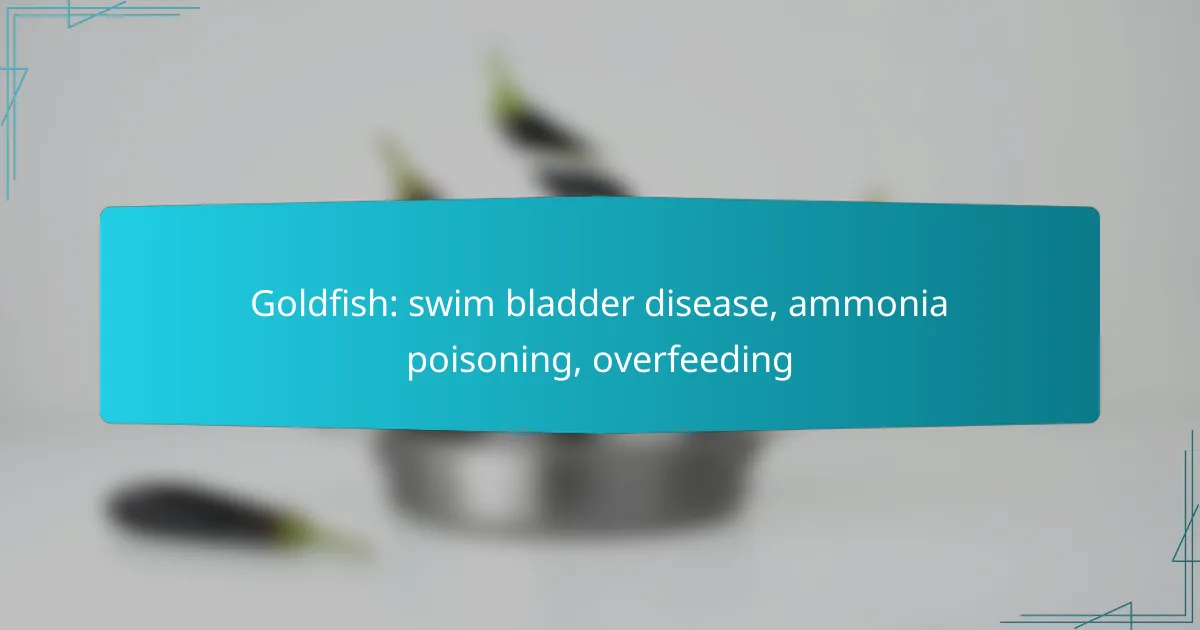Discus fish are beautiful and sensitive creatures that require careful attention to their environment to thrive. Maintaining optimal water quality is essential, as poor conditions can lead to stress and susceptibility to diseases. By understanding the signs of stress and common ailments, aquarists can take proactive measures to ensure the health and longevity of their Discus fish.

How to prevent diseases in Discus Fish?
Preventing diseases in Discus fish involves maintaining optimal water conditions, providing a balanced diet, and ensuring new fish are properly introduced to the tank. By focusing on these key areas, you can significantly reduce the risk of illness in your fish.
Regular water quality testing
Regular water quality testing is crucial for preventing diseases in Discus fish. Test for parameters such as pH, ammonia, nitrite, and nitrate levels at least once a week. Ideal pH for Discus is typically between 6.0 and 7.5, while ammonia and nitrite should remain at zero.
Use reliable test kits or strips to monitor these levels. If any parameters are out of range, take corrective actions immediately, such as partial water changes or adjusting filtration systems to ensure a healthy environment.
Proper diet and nutrition
A proper diet and nutrition are essential for the health of Discus fish. Feed them high-quality pellets, frozen or live foods, and ensure a varied diet that includes protein-rich options. Aim to feed them 2-3 times a day, providing only what they can consume in a few minutes.
Incorporate supplements like spirulina and vitamins to boost their immune system. Avoid overfeeding, as this can lead to poor water quality and increased disease susceptibility.
Quarantine new fish
Quarantining new fish before introducing them to your main tank is a vital step in disease prevention. Keep new arrivals in a separate tank for at least two weeks to monitor for any signs of illness. This practice helps prevent the spread of diseases to your existing fish population.
During quarantine, observe the new fish for any unusual behavior or symptoms, such as lethargy or changes in appetite. If any issues arise, consult a veterinarian or aquatic specialist for guidance.
Maintain stable water temperature
Maintaining a stable water temperature is critical for the health of Discus fish. The ideal temperature range is typically between 28°C and 30°C (82°F to 86°F). Sudden fluctuations can stress the fish and make them more susceptible to diseases.
Use a reliable aquarium heater and thermometer to monitor and adjust the temperature as needed. Regularly check for any equipment malfunctions that could lead to temperature changes.
Use probiotics
Using probiotics can enhance the health of your Discus fish and reduce disease risk. Probiotics help maintain a balanced gut flora, improving digestion and boosting the immune system. Consider adding probiotic supplements specifically designed for aquarium fish to their diet.
Introduce probiotics gradually and observe your fish for any changes in behavior or health. This proactive approach can contribute to a healthier aquarium environment and reduce the likelihood of disease outbreaks.

What are common diseases affecting Discus Fish?
Discus fish are susceptible to several diseases that can impact their health and well-being. Understanding these common ailments is crucial for effective management and prevention in aquarium settings.
Ich (White Spot Disease)
Ich, or White Spot Disease, is a prevalent parasitic infection in discus fish characterized by small white cysts on the skin and fins. This disease is caused by the protozoan parasite Ichthyophthirius multifiliis, which thrives in poor water conditions.
To treat Ich, raise the water temperature gradually to around 30°C (86°F) and add aquarium salt to the tank. It’s essential to maintain excellent water quality and avoid overcrowding to prevent recurrence.
Fin Rot
Fin Rot is a bacterial infection that leads to the deterioration of the fins and tail of discus fish. This condition often results from stress, poor water quality, or injuries, making it crucial to monitor environmental conditions closely.
To combat Fin Rot, improve water quality through regular changes and consider using antibacterial treatments. Quarantine affected fish to prevent the spread of the infection and ensure they receive adequate nutrition to support recovery.
Hole in the Head Disease
Hole in the Head Disease, or Hexamita, manifests as depressions or lesions on the head and body of discus fish. This condition is often linked to poor diet, water quality, and stress, making prevention through proper care essential.
To address this disease, enhance the fish’s diet with high-quality foods rich in vitamins and minerals. Regular water changes and maintaining stable water parameters can help reduce the risk of this condition.
Velvet Disease
Velvet Disease, caused by the parasite Oodinium, presents as a fine, gold dust-like coating on the fish’s body. This disease can lead to severe health issues if not treated promptly, often resulting from stress and inadequate water conditions.
Effective treatment for Velvet Disease includes raising the water temperature and using anti-parasitic medications. Maintaining a stable and clean environment is vital for preventing future outbreaks.

How does water quality affect Discus Fish health?
Water quality is crucial for the health of Discus Fish, as poor conditions can lead to stress, disease, and even death. Maintaining optimal water parameters is essential to ensure their well-being and longevity.
Importance of pH levels
The pH level of the water directly influences the health of Discus Fish. They thrive in slightly acidic to neutral conditions, typically between 6.0 and 7.5. Regularly testing and adjusting pH can prevent stress and promote better growth.
To maintain stable pH levels, consider using natural buffers like driftwood or peat moss. Avoid drastic changes, as rapid fluctuations can shock the fish and lead to health issues.
Impact of ammonia and nitrite levels
Ammonia and nitrite are toxic to Discus Fish, even at low concentrations. Ideally, ammonia levels should be undetectable, while nitrite levels should remain at zero. Regular water changes and proper filtration are vital to keep these levels safe.
Test your water weekly for ammonia and nitrite, especially in new tanks or after adding fish. If levels rise, perform immediate water changes and check your filtration system for effectiveness.
Temperature requirements
Discus Fish require warm water temperatures, ideally between 26°C and 30°C (79°F to 86°F). Maintaining this range is essential for their metabolism and overall health. Sudden temperature drops can lead to stress and illness.
Use a reliable aquarium heater and thermometer to monitor the temperature closely. Avoid placing the tank in drafty areas or near windows to prevent temperature fluctuations.

What are the signs of stress in Discus Fish?
Signs of stress in Discus Fish include changes in behavior and physical appearance that indicate discomfort or poor health. Recognizing these signs early can help prevent serious health issues and improve the well-being of your fish.
Color fading
Color fading is a common indicator of stress in Discus Fish. When these fish are stressed, their vibrant colors may dull significantly, making them appear less lively. This change can be caused by poor water quality, inadequate diet, or environmental factors.
To address color fading, ensure that the water parameters are stable, including temperature, pH, and ammonia levels. Regular water changes and a balanced diet can help restore their natural coloration.
Hiding behavior
Hiding behavior is another sign that your Discus Fish may be experiencing stress. If they frequently seek refuge behind plants or decorations, it may indicate that they feel threatened or uncomfortable in their environment. This behavior can stem from aggressive tank mates or sudden changes in their habitat.
To reduce hiding, assess the tank’s social dynamics and ensure that all fish are compatible. Providing ample hiding spots can also help them feel secure without excessive retreat.
Rapid gill movement
Rapid gill movement is a critical sign of stress and potential respiratory issues in Discus Fish. If you observe your fish breathing rapidly, it may indicate that they are struggling to get enough oxygen, often due to poor water quality or high levels of toxins.
To alleviate this issue, check the water parameters regularly and ensure proper filtration and aeration. If necessary, consider using an air pump to increase oxygen levels in the tank.










